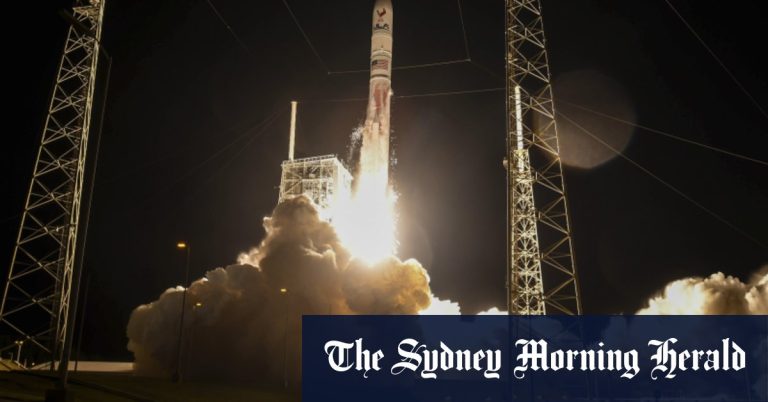If Peregrine succeeds, it will be the first soft landing for the United States on the moon since the last Apollo landing in 1972, and the first lunar landing by a private company — a feat that has proven elusive in recent years.
“This is the moment we've been waiting for for 16 years,” Astrobotic CEO John Thornton said after the lander's launch. Applause erupted in the launch control room as Peregrine was released from the booster stage, setting the golf cart-sized vehicle on a 46-day journey to the moon.

United Launch Alliance launches the next generation Vulcan rocket.credit: AP
This mission is the latest in recent years among countries and private companies hurtling towards the moon, a renewed phase of international competition in which scientists hope that the moon's water-bearing minerals will be exploited to support long-term astronaut missions.
The launch of Vulcan, a 60-meter rocket equipped with engines made by Jeff Bezos' Blue Origin, was a critical first for ULA, which developed Vulcan to replace its Atlas V rocket and compete with Elon Musk's SpaceX's reusable Falcon 9 in 2016. Satellite launch market.
“This has been years of hard work. So far, this has been an absolutely amazing mission,” ULA CEO Torey Bruno said in the launch control room for the Vulcan launch.
download
The stakes were high for Vulcan. Boeing and Lockheed, which own ULA in a 50-50 split, have been seeking to sell the company for about a year. The launch was the first of two approved flights required by the US Space Force before Vulcan can fly lucrative missions for the Pentagon, a major customer.
Peregrine is set to land on the Moon on February 23 with 20 payloads on board, most of which will seek to collect data about the lunar surface ahead of future planned human missions. It is the first trip to the lunar surface as part of NASA's Artemis lunar program.
This multibillion-dollar program, which involves various countries and relies heavily on private companies like SpaceX, envisions sending astronauts to the moon later this decade. Small landers like Peregrine will get there first.
A second private American company under the same NASA program expects to launch its own lander in February. Houston-based Intuitive Machines, which is carrying payloads similar to NASA and launching into space aboard a SpaceX Falcon 9 rocket, said its spacecraft could land on the moon on February 22 — one day before Peregrine.
Last year, India became the fourth country to achieve a soft landing on the moon after Russia failed in its attempt in the same month. The United States, China and the former Soviet Union are the only other countries to have carried out successful soft landings on the moon.
Private companies hoping to stimulate the lunar market have had a tough time, with Japan's iSpace and an Israeli company having to make an emergency landing on their first attempt.
AP, Reuters

